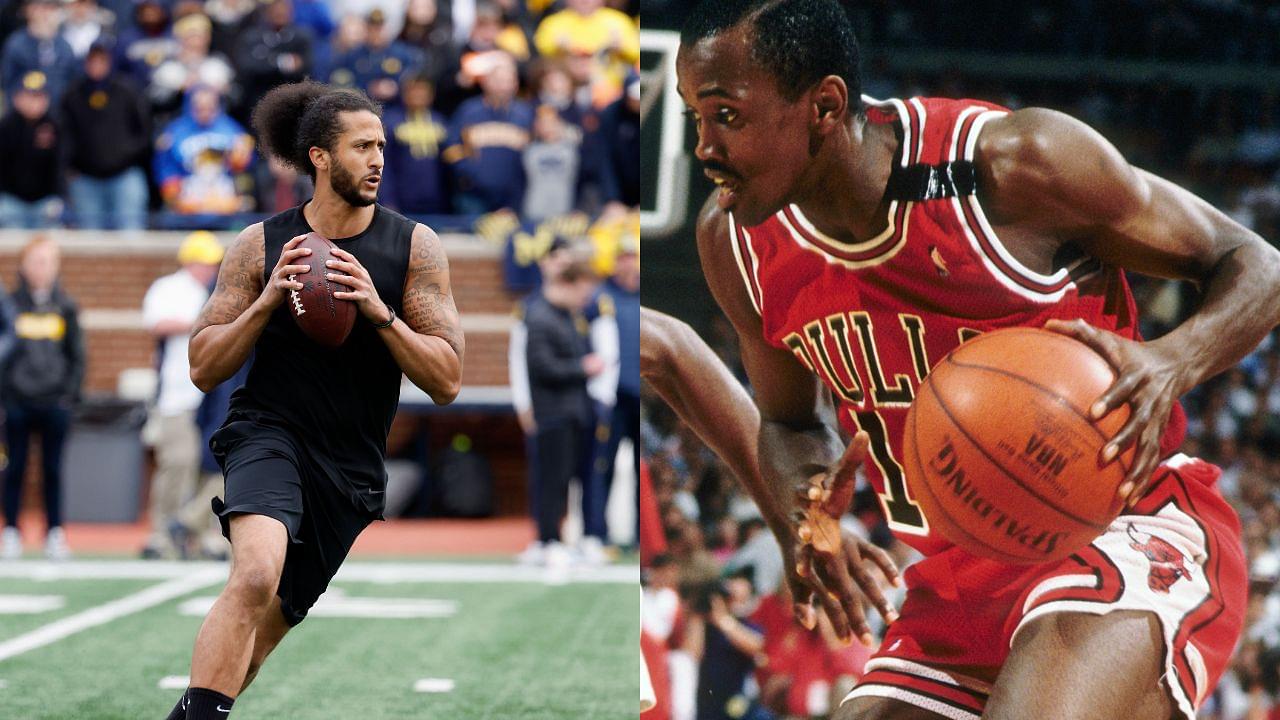Craig Hodges found himself in a tough situation in 1992, fighting for a social cause while also fighting for his job in the NBA. The scenario draws many parallels to Colin Kaepernick’s bout with the NFL.
Advertisement
Craig Hodges is a lesser-known role player from the Michael Jordan Bulls, but he played a valuable role for the team. Hodges was a member of the Chicago Bulls from 1988 to 1992, playing alongside Michael Jordan for four seasons.
He was never a massive scorer, but he was very good at the three-ball. For his career, Hodges shot a stellar mark in three-pointers, shooting at a 40% clip.
He was a credited member of the Bulls, but after an incident in the 1992 Finals, he was dropped from the team the next year, and he never played again in the NBA. Hodges believes he was blackballed from the league, similar to how Colin Kaepernick was from the NFL.
Larry Bird and Craig Hodges getting ready for the finals of the 1986 three point contest pic.twitter.com/MI9WfZm1ya
— Retro Awesomeville (@retro_70s) July 18, 2022
Craig Hodges story from 1992 will turn a few heads
Hodges was a big believer of social causes, and he was a major activist. His most notable effort game was during the 1991 Finals. The Bulls guard wanted to protest game 1 of the Finals against the Los Angeles Lakers by having players sit out the game.
Hodges wanted to protest the death of Rodney King, an African American protestor who was ruthlessly killed by police in Los Angeles. King was a victim of police brutality, and Hodges wanted to bring awareness to the situation by having players sit out.
Of course, to make the movement work, he needed support, and he decided to go to Michael Jordan and Magic Johnson right away as they were the biggest stars at the moment. He didn’t get the response he wanted, however.
“I knew the answer before I went to them,” Hodges explained to CBS Sports. “What’s funny to me, is how quick they dismissed it. Both conversations lasted less than two minutes. Magic was coming on the court the day before the first game, and I asked him about it and he tells me ‘it’s too extreme.’ I already discussed it with Mike in the locker room, and he tells me, ‘man, that’s wild, man.’ So it’s not anything I haven’t faced before.”
Hodges never played in the NBA again, and he filed a $40 million lawsuit against the NBA and all its teams, claiming he was blackballed from the league.
After the Finals, the Bulls were invited to the White House, and Hodges made sure to do everything he could do to bring some sort of awareness.
He wore a traditional African dress to the ceremony, the Dashiki, and he wrote a letter to President George H.W. Bush explaining the mistreatment African Americans faced.
Hodges’ story draws a parallel to Colin Kaepernick
Hodges’ main complaint with the NBA was that powerful Black athletes who had a lot of influence weren’t using their platform to do more good and raise awareness about these issues.
Things have definitely changed with regard to that. Colin Kaepernick started kneeling during the national anthem in 2016, sparking a wave of kneeling protests all around the country that run even now.
However, Kaepernick was met with a lot of resistance. President Donald Trump spoke out against him, and he demanded Kaepernick be fired.
In the end, Kaepernick also never got many chances to play after that season. He was quickly out of the league, and he never found a new home. Kaepernick similarly filed a lawsuit against the NFL claiming he was blackballed.
However, other NBA athletes have pushed for movements that have worked, something Hodges has noted. NBA players unified against shootings in 2020, even missing games as Hodges had wanted to do following the murders of George Floyd and Jacob Blake.
“It was beautiful,” Hodges explained. “I felt like all of the ancestors were smiling, and I said ‘man, our young brothers got some backbone.’ We already know the women have backbone, because they’ve been doing this and they’ll walk away from it, no issue. But it’s for the brothers that cling to the trinkets of white supremacy and racism and the things that come with it: a nice house in a gated community next to my billion-dollar owner.
“That’s what success has been modeled at for young African-American men. So now we talk about wanting to get out of the community as opposed to building it up. As opposed to how can I make my community reflective of my culture or heritage and still be appreciated.”
LeBron James thanked Colin Kaepernick for paving the way for acts like these. Kaep had written a note to LeBron including the line “Thank you for being true.”







